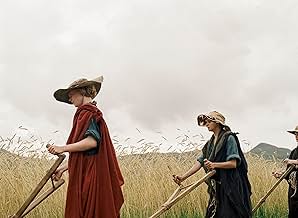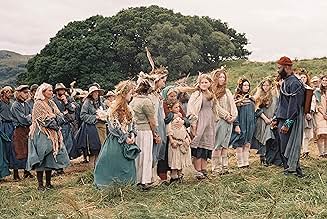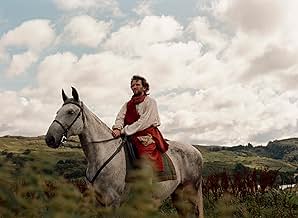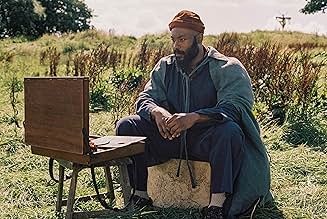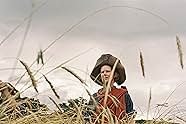Harvest
Le film suit la réaction des villageois face à trois nouveaux arrivants, qui deviennent des boucs émissaires dans une période de troubles économiques.Le film suit la réaction des villageois face à trois nouveaux arrivants, qui deviennent des boucs émissaires dans une période de troubles économiques.Le film suit la réaction des villageois face à trois nouveaux arrivants, qui deviennent des boucs émissaires dans une période de troubles économiques.
- Réalisation
- Scénario
- Casting principal
- Récompenses
- 4 nominations au total
Andrew McKeand
- William Kipp
- (as Andrew MacKeand)
Avis à la une
I saw this film a while ago now, in the cinema. I did not write a review at the time but as I was just looking back at its IMDB page I thought I might as well since it has stayed with me ever since. It takes a fascinating point in history and manages to evoke the meaning of this great change taking place to a modern audience who can not really truly comprehend what came before. The idea of land unseparated and fenced apart is so far off now. And the cinematography and caleb landry jones' performance in particular portray the immaterial meaning of that. Harry Melling is also good and despicable.
Harvest (2024), based on the novel with the same name by Jim Crace (2013), is a film directed by Athina Rachel Tsangari about a remote English village as economic progress disrupts their peaceful life following the "Inclosure acts". The opening shots introduce the protagonist, Walter Thirsk (played by Caleb Landry Jones), running through fields, playing with bugs and swimming in a lake, In other words, he's basking in nature and has some sort of spiritual moment (we later find out he was eating 'shrooms but it doesn't matter much to the plot).
Later we see a scene in a nearby village where people are trying to extinguish a fire, In this village we see the rest of the "action" (there's not much of it) in the movie. They have a master by the name of Kent (played by Harry Melling - Dudley Dursley in Harry Potter) who hires a chart maker, Phillip Earle, to map out the village. Walter (the main character) picks up an injury on his hand during the fire so he can't plough the land or help much with manual labour. Thus he becomes a de facto assistant to Phillip (the chart maker).
Oh, there's also some intruders to their land at one point, two men and a woman who cause a fight with the villagers. In a semi-comical way (probably intentional), the villagers hold the two men hostage and shave the woman's hair as punishment. The men stay as prisoners for about a week, while the woman runs away. The role of these characters, beside representing "the others" against which the villagers would (sort of) unite in a heavy-handed xenophobic way, doesn't amount to much. The rest of the story pans out in this simmering heat. I can't call it real tension because almost at no point in the movie did I really care about any of the characters. That could be my fault, but I surely wasn't helped along the way. If the director's intention was to portray a village that is on its way to disappear, she succeeded, just too early in the story for us to care.
Without spoiling much, some stuff happens later on, and if there's something that united the two main characters, Walter and Kent, it's their permanent disengagement with what is happening around them. It's a weird (and bold move) to tell a story through characters that are extremely passive, and it could work in theory, if the action around them is interesting enough, but it just painfully lacks any real tension.
I can't speak of the novel, as I haven't read it, but I did watch the film and here's how I would describe it in short: a confused tale about a village struggling for its existence with a main protagonist that just doesn't seem to care (and doesn't make us care either); all that is shot in a beautiful 16mm film that creates an eerie ambience that instead of providing clarity to the plot just muddies it even more.
Or if you prefer the official synopsis, "Over seven hallucinatory days, a village with no name, in an undefined time and place, disappears".
When it comes to aesthetics, it is undoubtedly a beautiful film. But as is often the case, the director falls in love with the form rather than the substance, and if in a novel that can work, film is a different medium and rarely does it satisfy audiences by self-indulging without giving anything substantial in return.
I can read and enjoy someone like Joyce or Proust obsess over textures, senses and feelings, but it's asking too much from the audience to create those descriptions in our heads out of beautiful shots in a film and at the same time remain engaged in the story, without providing at least some psychological nuance (if not action). The eeriness and dreamlike mood that it clearly goes for makes the film watchable, it's just not enough to keep me engaged in the characters and the plot itself. The confusion of the protagonist seeps through to the audience, and the story... well, we're never quite sure what to make of it.
Later we see a scene in a nearby village where people are trying to extinguish a fire, In this village we see the rest of the "action" (there's not much of it) in the movie. They have a master by the name of Kent (played by Harry Melling - Dudley Dursley in Harry Potter) who hires a chart maker, Phillip Earle, to map out the village. Walter (the main character) picks up an injury on his hand during the fire so he can't plough the land or help much with manual labour. Thus he becomes a de facto assistant to Phillip (the chart maker).
Oh, there's also some intruders to their land at one point, two men and a woman who cause a fight with the villagers. In a semi-comical way (probably intentional), the villagers hold the two men hostage and shave the woman's hair as punishment. The men stay as prisoners for about a week, while the woman runs away. The role of these characters, beside representing "the others" against which the villagers would (sort of) unite in a heavy-handed xenophobic way, doesn't amount to much. The rest of the story pans out in this simmering heat. I can't call it real tension because almost at no point in the movie did I really care about any of the characters. That could be my fault, but I surely wasn't helped along the way. If the director's intention was to portray a village that is on its way to disappear, she succeeded, just too early in the story for us to care.
Without spoiling much, some stuff happens later on, and if there's something that united the two main characters, Walter and Kent, it's their permanent disengagement with what is happening around them. It's a weird (and bold move) to tell a story through characters that are extremely passive, and it could work in theory, if the action around them is interesting enough, but it just painfully lacks any real tension.
I can't speak of the novel, as I haven't read it, but I did watch the film and here's how I would describe it in short: a confused tale about a village struggling for its existence with a main protagonist that just doesn't seem to care (and doesn't make us care either); all that is shot in a beautiful 16mm film that creates an eerie ambience that instead of providing clarity to the plot just muddies it even more.
Or if you prefer the official synopsis, "Over seven hallucinatory days, a village with no name, in an undefined time and place, disappears".
When it comes to aesthetics, it is undoubtedly a beautiful film. But as is often the case, the director falls in love with the form rather than the substance, and if in a novel that can work, film is a different medium and rarely does it satisfy audiences by self-indulging without giving anything substantial in return.
I can read and enjoy someone like Joyce or Proust obsess over textures, senses and feelings, but it's asking too much from the audience to create those descriptions in our heads out of beautiful shots in a film and at the same time remain engaged in the story, without providing at least some psychological nuance (if not action). The eeriness and dreamlike mood that it clearly goes for makes the film watchable, it's just not enough to keep me engaged in the characters and the plot itself. The confusion of the protagonist seeps through to the audience, and the story... well, we're never quite sure what to make of it.
Harvest (2024) is a drama (not a horror) about the dispossession of traditional rural communities from capitalist exploitation by the landowning class, and the internal conflicts within such communities. It is based on a book of the same name set in England, but adapted to film by Greek director Athina Tsangari and US producer Joslyn Barnes with the setting changed to Scotland and the historical period stripped of specificity. The film offers an exoticist generalised imaginary of rural island Scotland, based on something between the extended universe of The Wicker Man and the days of the witch trials, which I would speculate are the limit of the historical and cultural research that went into this film.
The central plot of the film, the employment of a mapmaker by the feudal overlord of the island in order to facilitate the exploitation of the land and remove the labour from it, is an interesting enough story of conflict between innovation and traditional community. Watching these themes explored through the 16mm cinematography, filmed on location in Argyll, Scotland, and some beautiful lines of dialogue, could be a nice film. But unfortunately, I am Scottish, albeit a lowlands, bourgeois Scot, and watched the film at one of few screenings in Scottish cinemas. My desire to see specificity, or at least some attempt at naturalism in the dialogue and depiction of quotidian life, therefore took over from any capacity to view the film's merits objectively. However, I feel that this criticism is appropriate because, at least in the screening I attended, the audience benefited from English subtitles. This suggested to me that the film's producers felt the use of authentic Scottish language was particularly exotic and important to the film's setting. So it's by this metric that I evaluated the film.
Firstly, I was somewhat impressed by the film's use of actors who could do authentic Scottish accents, although these were Glaswegian accents and surely nothing like how the crofters of ye olde times spoke. Some of the insults thrown by two characters who were pilloried for burning "Master Kent's" barn even got some decent laughs from the audience, when they stoically refused to be nice to their captors who offered them mercy. It makes a nice change from films about Scottish history performed by actors who can't accurately imitate any Scottish accent.
Then, there was everything else: the costumes that were Dark Ages bordering on Industrial Revolution. The neighbouring villager who had her hair cut off and inexplicably spoke Brazilian Portuguese as if it were a mystic jargon, despite some expository dialogue right at the start of the film emphasising the island's remoteness. (This character also in one scene pisses on the main character's face). The confusion between the Scottish history of the Highland Clearances, referenced by a mention of the villagers being replaced by sheep; and the English history of the Inclosure Acts, which was the setting of the Jim Crace novel on which the film is based, referenced by mentions of "the commons". The rather implausible claim by one villager on the island never to have seen the sea, which at least for me brought to mind stories of working class Glaswegians who had never seen the sea despite living only 10 miles away. Plausible but unusual of Glaswegians, not plausible at all of Scottish islanders.
Then the moment that the "Master's" cousin who owns the island's industry arrives, dressed dandyishly and with a posh English accent, suddenly the film begins to feel like a real costume drama. Perhaps this character was more closely based on the source material?
I feel that I wasted my time watching Harvest. It was misleadingly described as a horror, which it is not, and I left without any good reason to remember this film. It pales in comparison to The Wicker Man, from which it adopts stereotypes in its depiction of Scottish island life. Where Wicker Man did contextualise itself within Scottish social history, despite not being a serious historical film, Harvest refuses to indicate what its location and historical period are, opting instead for a generalised place and time, comprised of stereotypes about Scotland taken from horror films like Wicker Man and about the witch trials. Where Wicker Man had a clearly defined plot with an ending open to interpretation, Harvest has a slightly messy narrative but a relatively clear message.
I don't wish to be pedantic about every film set in Scotland, but this was filmed on location in Scotland and cast Scottish actors, so the producers clearly felt that authenticity was important. In fact, they knew that the script required authenticity, but they only delivered a surface-level form of it. If the aim of the film was to make a point about traditional rural communities, then this film has failed.
The central plot of the film, the employment of a mapmaker by the feudal overlord of the island in order to facilitate the exploitation of the land and remove the labour from it, is an interesting enough story of conflict between innovation and traditional community. Watching these themes explored through the 16mm cinematography, filmed on location in Argyll, Scotland, and some beautiful lines of dialogue, could be a nice film. But unfortunately, I am Scottish, albeit a lowlands, bourgeois Scot, and watched the film at one of few screenings in Scottish cinemas. My desire to see specificity, or at least some attempt at naturalism in the dialogue and depiction of quotidian life, therefore took over from any capacity to view the film's merits objectively. However, I feel that this criticism is appropriate because, at least in the screening I attended, the audience benefited from English subtitles. This suggested to me that the film's producers felt the use of authentic Scottish language was particularly exotic and important to the film's setting. So it's by this metric that I evaluated the film.
Firstly, I was somewhat impressed by the film's use of actors who could do authentic Scottish accents, although these were Glaswegian accents and surely nothing like how the crofters of ye olde times spoke. Some of the insults thrown by two characters who were pilloried for burning "Master Kent's" barn even got some decent laughs from the audience, when they stoically refused to be nice to their captors who offered them mercy. It makes a nice change from films about Scottish history performed by actors who can't accurately imitate any Scottish accent.
Then, there was everything else: the costumes that were Dark Ages bordering on Industrial Revolution. The neighbouring villager who had her hair cut off and inexplicably spoke Brazilian Portuguese as if it were a mystic jargon, despite some expository dialogue right at the start of the film emphasising the island's remoteness. (This character also in one scene pisses on the main character's face). The confusion between the Scottish history of the Highland Clearances, referenced by a mention of the villagers being replaced by sheep; and the English history of the Inclosure Acts, which was the setting of the Jim Crace novel on which the film is based, referenced by mentions of "the commons". The rather implausible claim by one villager on the island never to have seen the sea, which at least for me brought to mind stories of working class Glaswegians who had never seen the sea despite living only 10 miles away. Plausible but unusual of Glaswegians, not plausible at all of Scottish islanders.
Then the moment that the "Master's" cousin who owns the island's industry arrives, dressed dandyishly and with a posh English accent, suddenly the film begins to feel like a real costume drama. Perhaps this character was more closely based on the source material?
I feel that I wasted my time watching Harvest. It was misleadingly described as a horror, which it is not, and I left without any good reason to remember this film. It pales in comparison to The Wicker Man, from which it adopts stereotypes in its depiction of Scottish island life. Where Wicker Man did contextualise itself within Scottish social history, despite not being a serious historical film, Harvest refuses to indicate what its location and historical period are, opting instead for a generalised place and time, comprised of stereotypes about Scotland taken from horror films like Wicker Man and about the witch trials. Where Wicker Man had a clearly defined plot with an ending open to interpretation, Harvest has a slightly messy narrative but a relatively clear message.
I don't wish to be pedantic about every film set in Scotland, but this was filmed on location in Scotland and cast Scottish actors, so the producers clearly felt that authenticity was important. In fact, they knew that the script required authenticity, but they only delivered a surface-level form of it. If the aim of the film was to make a point about traditional rural communities, then this film has failed.
Harvest: Set in Scotland during an undefined era, maybe late medieval but some anachronisms suggest a later period. Steeped in folklore and the heritage of rural life, Folk Horror also intrudes on this less than idyllic existence. A fire destroys a barn but the Harvest Feast goes ahead the next day, The estate owner has brought a cartographer to his lands, lands we learn that are no longer his but belong to a cousin. The cousin wants to enclose the commons, drive off the tenants and introduce sheep to the land. The map is not the territory but by drawing boundaries and giving names to previously unnamed features a new reality is created. Maks and costumes which would not be out of place in The Wicker Man are worn by the villagers, folk songs and dances are performed. Some of which hint at an adherence to old beliefs. The downfall of the villagers lies in their fear and mistrust of outsiders and their willingness to blame other ordinary people for their troubles rather than their oppressors. Witches are hunted and there are some violent scenes and deaths but the real horror lies in how a time of changes brings destruction to a traditional way of life. At 131 minutes it is overlong and would have benefitted from a 20 minute cut in it's running time. Directed by Athina Rachel Tsangari, Screenplay by Joslyn Barnes and Tsangari from the 2013 book by Jim Crace, 7.5/10.
In cinemas, streaming on MUBI from 8 August.
In cinemas, streaming on MUBI from 8 August.
Somewhere in Britain in what appears to be the seventeenth century, a small village finds that its way of life, pretty much unchanged for generations beyond count, is under threat from outsiders.
The first outsiders are two men and a woman who are accused of arson - even though the fire was almost certainly started by villagers under the influence of magic mushrooms. The second is a map-maker (beautifully played by Arinze Kene) brought in by the lord of the manor, Master Kent (Harry Melling) to chart the village with a view to increasing it's wealth through raising more sheep. Last there is Master Jordan (Frank Dillane, who's performance is both understated and wonderfully sinister). He's the cousin of Kent's late wife, and announces that he's now the legal owner of the village and intends to evict everyone to turn the place entirely over to sheep.
Also key to events is Walt (Caleb Landry Jones) an outsider who was Kent's boyhood friend who married a village girl (now deceased) and is simultaneously part of the village and not part.
Oddly for the seventeenth century, there is no priest or any other religious figure either in the community or amongst the outsiders.
Suspicion and paranoia erupt; a crime is committed (we never do find out who perpetrated it); neighbour turns against neighbour; Kent and Walt are revealed to be seriously lacking in backbone; and things end with a scene out of Fiddler on the Roof.
The cinematography is excellent and the landscape is a character in and of itself - but the film overall is a disappointment. The viewer is led to expect that there will be some sort of climax - presumably a bloody one - but the film just tails off into nothing.
The first outsiders are two men and a woman who are accused of arson - even though the fire was almost certainly started by villagers under the influence of magic mushrooms. The second is a map-maker (beautifully played by Arinze Kene) brought in by the lord of the manor, Master Kent (Harry Melling) to chart the village with a view to increasing it's wealth through raising more sheep. Last there is Master Jordan (Frank Dillane, who's performance is both understated and wonderfully sinister). He's the cousin of Kent's late wife, and announces that he's now the legal owner of the village and intends to evict everyone to turn the place entirely over to sheep.
Also key to events is Walt (Caleb Landry Jones) an outsider who was Kent's boyhood friend who married a village girl (now deceased) and is simultaneously part of the village and not part.
Oddly for the seventeenth century, there is no priest or any other religious figure either in the community or amongst the outsiders.
Suspicion and paranoia erupt; a crime is committed (we never do find out who perpetrated it); neighbour turns against neighbour; Kent and Walt are revealed to be seriously lacking in backbone; and things end with a scene out of Fiddler on the Roof.
The cinematography is excellent and the landscape is a character in and of itself - but the film overall is a disappointment. The viewer is led to expect that there will be some sort of climax - presumably a bloody one - but the film just tails off into nothing.
Meilleurs choix
Connectez-vous pour évaluer et suivre la liste de favoris afin de recevoir des recommandations personnalisées
Détails
Box-office
- Montant brut mondial
- 54 537 $US
- Durée2 heures 11 minutes
- Couleur
- Mixage
- Rapport de forme
- 1.66 : 1
Contribuer à cette page
Suggérer une modification ou ajouter du contenu manquant



